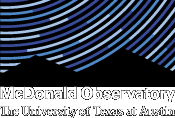Astronomers Solve Mystery of Formation of First Supermassive Black Holes
AUSTIN — An international team of researchers has successfully used a supercomputer simulation to recreate the formation of a massive black hole from supersonic gas streams left over from the Big Bang. The study will be published tomorrow in the journal Science, in a paper led by Shingo Hirano of The University of Texas at Austin's Department of Astronomy.
“This is significant progress. The origin of the monstrous black holes has been a long-standing mystery and now we have a solution to it,” Hirano said.

